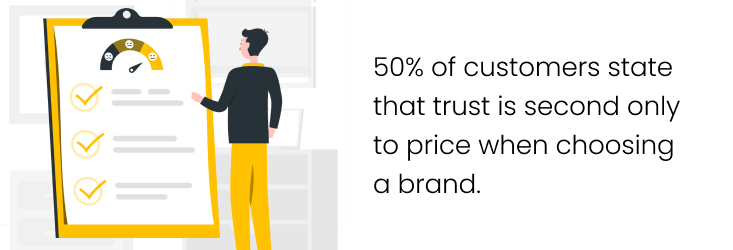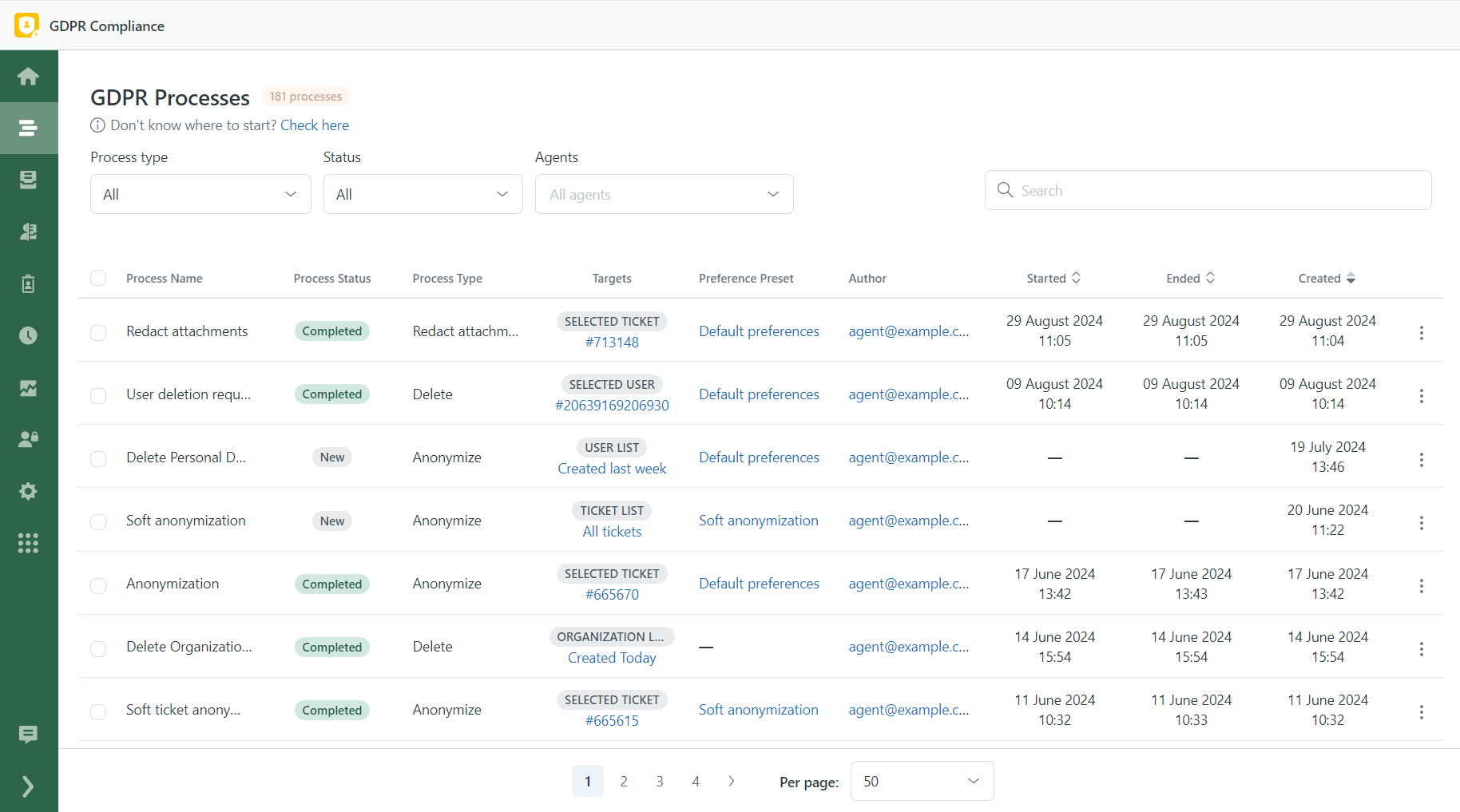In our article, we will give you a clear explanation of why it is important as well as provide you with fourteen easy steps on how to build trust with customers in no time. So, let’s get started.
What is Customer Trust?
First off, let's define what customer trust is. Simply put, it is nothing more than matching customers' expectations with the company's promises. If the product or service delivers on the company's promises, then magic happens — consumer trust is gained.
So, is this that simple?
Not really. The challenge with building trust with customers is that you can’t make or force your customers to think that your company is trustworthy. Instead, you need to carefully nurture trust with the help of the right marketing and communication strategies, remembering that each of your interactions with customers is an opportunity for success.
Why is Consumer Trust Important?
Building trust in customer service is crucial as never before. With so many options When they trust your service team to handle their concerns with empathy and efficiency, they’re more likely to choose your brand, remain loyal, and even recommend you to others, and even forgive occasional slip-ups.
The impact of trust on customer retention
Customer retention is often more cost-effective than acquiring new customers. Yet, without trust, retaining customers becomes nearly impossible. When customers trust a brand, they feel more secure and confident in their buying decisions. This sense of security leads to repeat purchases, as customers are less likely to explore alternative options.
Consider these compelling statistics from Edelman:
- 50% of customers state that trust is second only to price when choosing a brand.
- 70% of customers believe that trust is more important today than ever before.
- 74% of customers say that a brand’s impact on society is a reason why trust issues have become more significant today.
These numbers highlight that companies that prioritize trust are more likely to see improved customer retention rates, which ultimately leads to sustained business growth.

Building long-term relationships through trust
Trust is the foundation upon which long-term customer relationships are built. When customers trust a brand, they’re more likely to feel an emotional connection to it. This connection is essential for nurturing loyalty and creating brand advocates. But how can you build customer trust effectively? It starts with consistent communication, delivering on promises, and showing genuine care for your customers’ needs.
Establishing trust takes time and effort, but the rewards are worth it. It’s not just about keeping customers coming back — it’s about creating a community of loyal supporters who believe in your brand’s values and vision. By fostering trust, you’re not just gaining customers; you’re building a brand legacy.
14 Easy Ways How To Build Trust With Customers
So, how to build customer trust? Here are fourteen easy ways to build trust with your customers in no time.
1. Address and learn from negative feedback
Always remember that you can’t please every customer. Negative feedback happens but you should not delete them as it can help you with building trust with clients, too. How? Just by showing that you care about your customers and addressing their concerns. Besides, if you regularly delete customers’ negative feedback, it will only show your customers that you filter out everything or even use fake positive reviews. And you don’t want this, right?
2. Avoid misleading practices
The way you market your business directly influences your products or services. If you try to hype and drive traffic by using clickbait tactics and overpromising, the chances that your customers will trust you are… zero. So, how to gain customers' trust, then?
Instead, if you want to meet customers' expectations, you should always be honest and transparent about the service or products you offer. This, in turn, will help you build a strong bond, establish consumer trust, and attract more happy customers.
3. Implement loyalty programs to reward customer retention
Good customer loyalty programs can level up your sales and increase the customer's lifetime value. Basically, their main goal is to make your customers return and continue buying from you over and over again, which is essential when considering how to build trust with customers. Besides, it creates an emotional connection with your brand and, if used in combo with personalization, can do wonders, really.
What are the most common customer loyalty programs? For the eCom sector, it usually includes some free bonuses for return customers, early access, and promotions. For B2B, it may include some useful content or early bird invitations for webinars or some events.
4. Provide nothing more than excellent customer service
61% of Americans state they will switch the company in case of even a one-time poor customer service occasion. Sounds terrifying for a business, right?
Surely, the way you provide your customers with support reflects directly in their trust and loyalty. That is why it is essential to train your customer service representatives according to the highest standards.
What does this mean? They need to have an established framework on how to troubleshoot the customers' issues and treat each of the issues individually. This way, your customers will receive a professional, effective, and, what is more important, personalized experience. Besides, if your loyal customer base feels they are treated superiorly, they are most likely to return and recommend you to their friends and family.
5. Always stay consistent across all channels
You should always stay consistent in each interaction with your customers, as even the smallest fallback may influence your reputation badly. Besides, if you are consistent, customers treat your business as credible. But how to become consistent? Here the recipe is simple, just employ standard working procedures, clear policies, and accommodating practices.
6. Transparency is key
Transparency is the foundation of trust in customer service. What does it involve? It means staying open and honest with each company’s actions:
- Giving your customers detailed information about all your products or services
- Coming clean about how your company is operated
- Resolving and giving answers to all the customers’ issues and complaints
- Telling stories of the companies’ employees
Staying transparent with your customers means that you are honest, which, as well, can help with building customer trust. Besides, it makes customers feel more engaged by showing them some insights into how the company is operated.
7. Align business practices with core values
Another powerful way of building customer trust is to show them your core company values. We are talking about both internal and external values. For example, the internal ones should be about how you treat your employees and external ones — your partnerships with some non-profits, NGOs, or fundraising companies that are working on some social, political, or environmental issues.
How do we communicate these issues? You can create the statement with the list of your company values on your website and social media, or include it in your PR strategy and ensure that you take the actions that reflect these values. Here are some steps that can help you:
- Creating content for social media where you show your support for some environmental issues
- Creating landing pages on your partnership with some non-profits or NGOs
- Share on your social media some information about your employees: their working hours, working conditions, benefits, etc.
8. Ask for feedback
Every customer wants to be sure that the company they interact with cares about their opinion. So, do not underestimate asking for feedback and receiving customer reviews from them, as this step can help you in different aspects:
- Customers feel heard which is a great way how to build customer trust and loyalty
- Customers’ feedback helps you further improve your products or services
- You improve customer retention rate and, consequently, decrease the churn rate
Now the question is ‘How to receive feedback from your customers?’ There are different ways, but the good old survey is probably the most widespread option.
9. Study your target audience
Studying your target customers by conducting marketing research is still a very important step, as today, most customers are willing to get a personalized approach. So, you need to thoroughly study your customers’ needs and issues they have together with their pain points to create the right messages that resonate with them.
Besides, if your customers see a deep understanding of their needs and receive the service that properly resolves their issues and provides them with added value, the chances that they will trust you are much higher.
10. Create a good reputation
As Warren Buffet, the world-known business magnate, once said:
And he is totally right. The company's reputation consists of meeting the highest standards — from hiring and training employees to producing quality products and providing professional services. And you should always be sure that you adhere to those standards if you want to have a good reputation and be able to build consumer trust.
Another way to earn a good reputation is to make customers trust you. In this case, showing you are GDPR compliant will impact a company's perception in clients' eyes. They should know how you process and protect their data. This formula creates a good reputation for you.
If you are a Zendesk user, you no longer need to process customers' data manually. The GDPR Compliance application will do it instead of you. Agents can sort out the data with users, tickets, and organizations, making different lists. After, items from these lists can be deleted or anonymized. Besides, you can combine lists and launch the GDPR processes automatically. Read more here and try out the app for free.

11. Share your knowledge
You have been working for a while, which means you already know many things about your industry and can share your knowledge with your customers. How can you build customer trust and loyalty using your knowledge?
Create and share helpful tips and best industry insights on how to get the most out of your products and services. This doesn’t mean you have to invest much time in it but it really can bring added value for your customers. Your customers will surely appreciate your initiative and treat your company as credible.
12. Stay in contact with your customers
Your contact page is not only the most visited page on your website but also the main touchpoint for your customers to get in touch with you. So, make sure this page is user-friendly, has an intuitive design, and contains all the contact details your company has: mobile or stationary numbers, emails, social media pages, and live chat if you have one. Be proactive!
13. Seamlessly assist your customers with their issues
Solving your customers' problems seamlessly is a very important step in building trust with your customers. Especially if customers face some problems with your product or service. What are the principles of outstanding customer service?
- Resolving issues fast while demonstrating empathy, kindness, and attentiveness to customers
- Using multiple channels for communication with your customers
- Finding unique and personalized solutions to each of the issues
If you are a Zendesk user or just looking closely at this platform, try our apps, themes, or services for Zendesk. Our team will help you maintain a seamless and rapid service while staying on the same wavelength as your customers.
14. Create a community around your brand
Building client trust isn’t just about one-on-one interactions — it’s about creating a space where customers feel they belong. By fostering a community where your customers can connect, share experiences, and learn from one another, you create an ecosystem of trust.
Whether it's through a dedicated online forum, social media groups, or hosting exclusive events, these spaces show that you value your customers beyond transactions. A strong community not only amplifies your brand but also builds a sense of loyalty and trust that turns customers into long-term advocates.
Key Takeaways
In summary, trust is the glue that bonds customers with your brand. Companies that find a way to build trust with their customers nurture life-lasting customer relationships and attract thousands of brand advocates.

There is no universal secret on how to build trust with customers — you just always need to have your customer in mind whatever you do. Provide them with outstanding and personalized customer service. Stay always honest, transparent, and contactable. Communicate your values, share your knowledge, and ask for feedback. That is an easy way to gain trust and become successful in no time.
FAQs
How long does it take to earn customer trust?
Building customer trust isn't an overnight process. It can take weeks, months, or even years, depending on the nature of your business and your consistency in delivering positive experiences. Trust develops over time through reliable, transparent, and customer-centric actions. The key is to meet or exceed customer expectations consistently.
What common mistakes can destroy customer trust?
The fastest way to lose customer trust is through dishonesty, broken promises, or poor customer service. Hidden fees, misleading marketing, and unaddressed complaints are some of the biggest mistakes businesses make. These behaviors create frustration, dissatisfaction, and damage relationships beyond repair, making it hard to regain customer confidence.
How can small businesses establish trust with their customers?
Small businesses can build trust by focusing on personalized service, maintaining open communication, and delivering on their promises. Transparency, authenticity and a commitment to customer satisfaction go a long way. Offering loyalty programs, responding quickly to inquiries, and showcasing customer testimonials can also help small businesses create trust-based relationships.
Is it possible to rebuild trust after it’s lost?
Yes, trust can be rebuilt, but it requires time, effort, and a genuine commitment to addressing the issues that led to its loss. A business must acknowledge its mistakes, offer sincere apologies, and take corrective actions. Consistently delivering on promises and demonstrating transparency moving forward will help rebuild customer confidence over time.
How does social proof affect customer trust?
Social proof — such as reviews, testimonials, and case studies — plays a significant role in establishing customer trust. When potential customers see that others have had positive experiences with your brand, they’re more likely to trust and choose your products or services. Social proof acts as validation, helping build credibility and confidence in your business.

Gain customer trust with the GDPR Compliance app
Protect data privacy and stay compliant!
Install now







